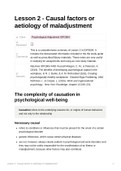Lesson 2 - Causal factors or
aetiology of maladjustment
Class Psychological Adjustment IOP2604
Reviewed
This is a comprehensive summary of Lesson 2 in IOP2604. It
includes the demarcated information included in the the study guide
Comments as well as prescribed library materials. These notes are very useful
in studying for assignments and using as core study material.
MyUnisa IOP2604 AND Youssef-Morgan, C. M., & Petersen, K.
(2019). The benefits of developing psychological capital in the
workplace. In R. J. Burke, & A. M. Richardsen (Eds), Creating
Sources psychologically healthy workplaces . Edward Elgar Publishing. AND
Rothman, I., & Cooper, L. (2015). Work and organizational
psychology . New York: Routledge, chapter 13:230–231.
The complexity of causation in
psychological well-being
Causation refers to the underlying reasons for, or origins of human behaviors
and not only to the relationship
Necessary causal
refers to conditions or influences that must be present for the onset of a certain
psychological disorder
genetic influences, which cause certain physical diseases
are not, however, always clearly evident in psychological and work disorders and
they may not be solely responsible for the manifestation of an illness or
maladjustment, because other factors may also contribute
Lesson 2 - Causal factors or aetiology of maladjustment 1
, Sufficient cause
will definitely bring about a certain psychological disorder
work loss, unemployment or any other traumatic event may be a sufficient cause
for depression or anxiety-based disorders
Sufficient causes may not, however, be necessary causes, as anxiety and
depression may also be caused by many other genetic and environmental
factors
A traumatic event may therefore not be the real cause of the problem, but only
the triggering mechanism
Contributory causes
factors which may create a predisposition to or the “right conditions” for a
psychological disorder to develop
Diathesis may include early influences or contributory influences, which may,
however, not necessarily be sufficient to cause the onset of a problem
Moderating influencing factors
~ may determine the onset of psychological problems or stress reactions, or which
may increase or decrease the seriousness or impact of manifested problems
The importance of stressors, the number of demands and the duration and
proximity of stressors may influence a person's psychological health or illness
People’s stress appraisal or perception of daily hassles and life events as
having meaning, that is, as being irrelevant, relevant or threatening, is an
important influence on their reactions or coping behaviors
People’s stress tolerance and internal and external sources of adjustment will
also determine how they react to stressors. In this regard, it is particularly
important to note how people perceive the stress factors (positive or negative),
their internal stress coping techniques (e.g. problem-solving behaviors) and
external coping resources in the environment
Lesson 2 - Causal factors or aetiology of maladjustment 2




